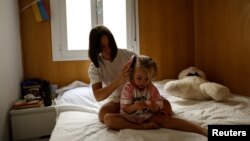ນັກຈິດຕະວິທະຍາຢູເຄຣນ ນາງຕັດຢານາ ບັອກໂກວາ ໄດ້ເດີນທາງໄປປະເທດໂປແລນ ໃນວັນເກີດກັບແມ່ຂອງລາວ ແລະລູກສາວອາຍຸ 4 ປີ ເວລາຣັດເຊຍໄດ້ບຸກລຸກບ້ານເກີດຂອງລາວ ໃນຕົ້ນປີນີ້ ອີງຕາມລາຍງານຂອງອົງການຂ່າວຣອຍເຕີ.
ໂດຍມີລູກປືນໃຫຍ່ຕົກລົງມາໃສ່ເມືອງຄາກິບ ແລະສາມີທີ່ເປັນຕຳຫລວດໄດ້ຢູ່ທີ່ນັ້ນ ເພື່ອສູ້ລົບ ນາງມີອາຍຸ 32 ປີ ໄດ້ເລືອກເອົາການລີ້ໄພຢູ່ປະເທດສະເປນ ບ່ອນທີ່ນາງໄດ້ແປປະຫວັດການເຮັດວຽກ ແລະຮຽນພາສາ ໃນຄວາມຫວັງທີ່ຈະໄດ້ວຽກເຮັດ.
“ຂ້າພະເຈົ້າບໍ່ຢ້ານວຽກໃດໝົດ ແຕ່ວ່າຢາກເຮັດໃນສິ່ງທີ່ໄດ້ຮຽນມາ” ນາງບັອກໂກວາ ກ່າວວ່າ ຢູ່ຮ້ານກາເຟມາດ ຣິດ ໃກ້ກັບສູນກາງຊ່ວຍເຫລືອຂອງໂບດກາໂຕລິກ ຊຶ່ງທັງໝົດຄອບຄົວ ໄດ້ສະເໜີຊ່ວຍໃຫ້ເຂົາເຈົ້າໃຫ້ຢູ່ເຮືອນຟຣີຈົນຮອດເດືອນທັນວາ.
“ທຸກໆມື້ ຂ້າພະເຈົ້າຊອກຫາແນວຄິດໃໝ່ວ່າ ຈະເຮັດວຽກຢ່າງໃດ ໃນຂະນະທີ່ລູກສາວຂອງຂ້າພະເຈົ້າ ຢູ່ໂຮງຮຽນ” ເພີ້ມກັບຊາວຢູເຄຣນ ຜູ້ທີ່ຢ່າງໜ້ອຍທຳຄວາມສະອາດຮ້ານກາເຟສີ່ຄືນ ພ້ອມດ້ວຍແມ່ຂອງລາວ ແລະຍັງອາສາສະໝັກຂຽນຂ່າວລົງສື່ສັງຄົມເພື່ອອົງການການກຸສົນ.
ນາງບັອກໂກວາ ແລະຄອບຄົວຂອງລາວແມ່ນຮວມຢູ່ໃນພວກອົບພະຍົບຢູເຄຣນ 7 ລ້ານ 6 ແສນຄົນ ທີ່ໄດ້ ແຈກຢາຍກັນຢູ່ທົ່ວຢູໂຣບ ນັບແຕ່ປະທານາທິບໍດີວລາດີເມຍ ປູຕິນ ໄດ້ສົ່ງກຳລັງທະຫານຂ້າມຊາຍແດນເຂົ້າໄປ ແລະຖີ້ມລະເບີດຢ່າງໜັກໃສ່ເມືອງຕ່າງໆ ຄືກັບເມືອງຄາກິບ.
ຊາວຢູເຄຣນໃນຂັ້ນຕົ້ນໄດ້ຖືກຕ້ອນຮັບຢ່າງອົບອຸ່ນເຂົ້າສູ່ທີ່ພັກພາອາໄສ ແລະເຮືອນຊານຢູ່ທົ່ວຢູໂຣບ ບ່ອນທີ່ພວກເຈົ້າໜ້າທີ່ໄດ້ດຳເນີນການເລັ່ງລັດຢ່າງໄວ ເຮັດໃຫ້ຊາວອົບພະຍົບຈາກຊິເຣຍ ອາຟຣິກາ ແລະອື່ນໆພາກັນຕື່ນຕົກໃຈ.
ຍັງບໍ່ເທົ່ານັ້ນ ໃນຂະນະທີ່ສົງຄາມໄດ້ແກ່ຍາວເຂົ້າມາເປັນເວລາແປດເດືອນ ແລະຄວາມຫວັງຂອງເຂົາເຈົ້າທີ່ຈະກັບຄືນບ້ານນັ້ນໄດ້ຕ່ຳລົງ. ຫລາຍຄົນຮູ້ສຶກຖືກຫຼົງລືມ ແລະດິ້ນລົນເພື່ອເອົາໂຕລອດ.
ວິກິດການກ່ຽວກັບຄ່າຄອງຊີບຂອງຢູໂຣບ ຮວມທັງຄ່າພະລັງງານແມ່ນແພງໃນຂະນະທີ່ລະດູໜາວກຳລັງຈະມາເຖິງ ຍິ່ງເປັນອັນຕະລາຍຫຼາຍຂຶ້ນສຳລັບພວກເຂົາເຈົ້າ.
Ukrainian psychologist Tatyana Bogkova was on a birthday trip in Poland with her mother and 4-year-old daughter when Russian troops invaded her homeland earlier this year.
With shells raining on Kharkiv city and her policeman husband staying to fight, the 32-year-old chose to take refuge in Spain, where she quickly translated her CV and took language lessons in hopes of a job.
She is still searching.
"I am not afraid of any job, but I would like to do what I learned," Bogkova said in a Madrid cafe near a Catholic Church aid center, which together with a family offered her and her family free housing until December.
"Every day I look for ideas on how to work while my daughter is at school," added Bogkova, who with her mother cleans a cafeteria every other week and also volunteers on social media content for a charity.
Bogkova and her family are among 7.6 million Ukrainian refugees scattered around Europe since Russian President Vladimir Putin sent troops over the border and heavily bombarded cities like Kharkiv.
The Ukrainians were initially welcomed with open arms into shelters and homes across Europe, where authorities skipped bureaucratic hurdles at a speed that raised eyebrows among refugees from Syria, Africa and elsewhere.
Yet as the war drags into its eighth month and their hopes of a quick return recede, many feel in limbo and are struggling to make ends meet.
Europe's cost-of-living crisis, including soaring energy bills just as winter looms, has exacerbated their plight.




